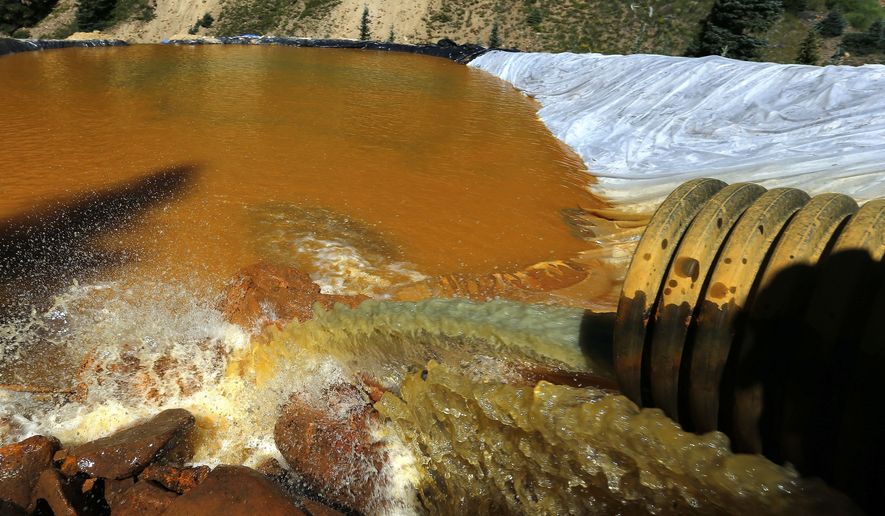DENVER — The Environmental Protection Agency came under fire Thursday after an official said the agency would not fully cover a Colorado county’s expenses stemming from the EPA-caused toxic wastewater spill at the Gold King Mine.
Colorado Republicans blasted the agency after the Durango Herald reported that an EPA official nixed some of La Plata County’s proposed cooperative agreement for $2.4 million in spill-related costs over 10 years at a Wednesday meeting of the county’s board of commissioners.
Sen. Cory Gardner, Colorado Republican, described the report as “outrageous” and “yet another example of the Washington double standard,” adding that he would work to ensure that the agency compensates the region for “property damage and lost economic opportunity.”
“The EPA must keep its promise to the people of Colorado and abide by the standards it expects of others,” Mr. Gardner said in a statement. “I’ll do everything I can to ensure La Plata County, San Juan County, affected tribal communities, and my constituents are fully compensated and the EPA is held wholly accountable for its negligence.”
Bill Murray, Superfund remedial program director, told county commissioners that the cooperative-agreement program was not designed to cover anticipated expenses such as monitoring of spill effects and water quality, according to the Herald.
He also said the agency had cut off reimbursement for response costs stemming from the Aug. 5 spill after ending its emergency-response activities Oct. 31.
“The intent is not that this co-op agreement would cover future activities,” Mr. Murray said. “For Superfund sites, we don’t often have future costs included. The program is not designed to provide for a lot of what is in there.”
County staff spent hundreds of hours drafting the proposed agreement after being told to do so by the EPA, and yet the document was “done on arrival,” said county attorney Sheryl Rogers.
The EPA responded Thursday by releasing a list of its payments to date to local governments, including $197,792 to La Plata County for “allowable removal response expenses” related to the spill, as well as $9,786 on April 1 as part of a Superfund Cooperative Agreement.
The agency is also evaluating $140,000 in additional expenses incurred by the county before Oct. 31.
“EPA takes responsibility for the Gold King Mine release and is committed to continue working hand-in-hand with the impacted local governments, states and tribes,” said the agency’s statement.
County commissioner Julie Westendorff said that the region has incurred a significant economic hit from the spill that extend beyond Oct. 31.
“What’s the mechanism for recovering actual damages that our community, the city of Durango, the Southern Utes, San Juan County and Silverton incurred, that aren’t out-of-pocket? That were damages to our reputation, for lack of a better word?” Ms. Westendorff asked.
“We have a fishing, rafting and tourism industry that people come here for. We took a big hit on it. Oct. 31 wasn’t the last day we had costs – that’s when your (the EPA’s) response was over,” she said.
Republican Rep. Scott Tipton, who represents the southwest Colorado region, called the response “par for the course with the EPA.”
“I have been skeptical of the EPA’s management of this situation from the onset and find it offensive to the communities in my district that the EPA, who is directly responsible for this disaster, has so blatantly admitted La Plata County, and others, will not receive full compensation for the damages caused by this spill,” said Mr. Tipton in a statement.
The EPA has set up a $2 million fund to support states’ and tribes’ long-term monitoring plans. The agency has also provided reimbursements for expenses incurred by other governmental entities, including states, tribes, the towns of Silverton and Durango, and San Juan County.
An EPA-led team uncorked 3 million gallons of contaminated orange wastewater during a clean-up job at the Gold King Mine near Silverton, Colorado, after failing to gauge the water level behind a wall of debris.
The sludge contaminated water supplies in Colorado and New Mexico after spreading from the Animas River to the San Juan River.
• Valerie Richardson can be reached at vrichardson@washingtontimes.com.




Please read our comment policy before commenting.